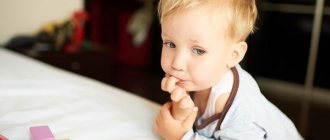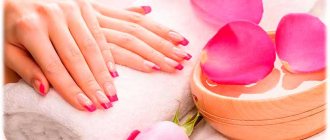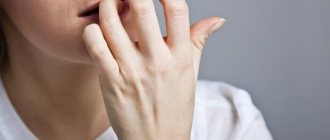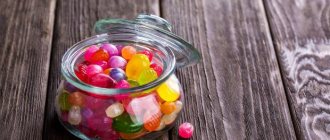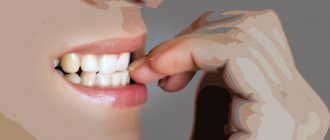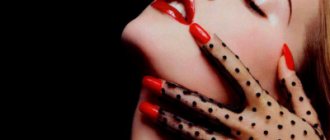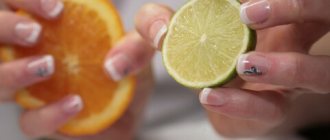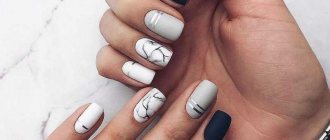09/29/2016 Nadezhda Plotnikova 4 comments
Bitten nails and unpleasant hangnails are a common situation, since the habit of pushing fingers into the mouth is common to both young children and teenagers.
It seems that onychophagia - the scientific name for this problem - is not so scary. And yet you need to fight it, despite my mother’s numerous experiences of “I can’t”, “nothing works out”.
To decide how to stop a child from biting his nails, you must first discover the “trigger” of the habit, and only then take certain measures.
Disease or bad habit?
It is not for nothing that psychiatrists introduced a special definition into medical practice - onychophagia. This term implies a mental disorder (!), which is expressed in an uncontrollable desire to bite the nail plate.
This disorder develops gradually, moving from a seemingly harmless habit.
Surveys have shown that almost a third of children of primary school age are prone to biting their nails, and this habit is much more common among male children.
Then the incidence only increases, since almost half of children bite their fingers during adolescence. This may be due to the increasing psychological stress.
That is, a bad habit cannot be left alone with a child, hoping that he will outgrow it. On the contrary, there is a risk that the problem will simply develop into a mental disorder, which cannot be overcome without the help of doctors.
Therefore, you need to find the provoking factor and, if possible, get rid of it.
How to wean
According to Dr. Komarovsky, it is necessary to help the child, otherwise the problem will spread into adulthood. The older he gets, the more difficult it will be for him to get rid of his bad inclination. It’s better to start weaning by observing your baby, so it’s easier to understand in what situations he bites his nails. Having identified the mechanism that triggers the bad habit, act:
- Offer a baby suffering from painful teething to chew on solid food: a cracker, a piece of carrot or apple, a chilled teether. Let a child aged 3–4 years chew dried fruits, seeds, and nuts.
- If a child bites his nails out of boredom, offer him a joint game - assemble a house from a construction set, do some appliqué or drawing.
Buy a tactile toy: an object that you can knead and finger in your hands. Learn a new hobby together. - Does your baby bite his nails when he's nervous? Limit your time watching cartoons, choose calm, kind pictures. Watch them with your child, in anxious moments, hug the baby or switch your attention. If the baby himself is very excitable, take him to a specialist: a psychologist, a neurologist.
- Parents are entirely responsible for stressful situations in the family; try to maintain a calm atmosphere in the house.
- Monitor the length of your child's nails, trim them as needed, and clean the area underneath them. Show your child a photo of germs and other harmful creatures that can live in his stomach. Don’t choose too scary pictures: your child doesn’t need unnecessary stress.
- If a student finds it difficult to complete homework on his own, offer him your help and ask leading questions.
Listen also to the unconventional advice of child psychologist Marina Romanenko.
Why does a child bite his nails?
Sometimes it is extremely difficult to understand exactly where such an unpleasant problem came from.
Experts talk about possible physiological and psychological factors that “turn on” onychophagia. 1. Physiological factors:
- Condition of the cuticle. In some small children, the skin around their nails constantly “puffs up.” Without waiting for parental help, they try to remove the irritant on their own. This behavior is somewhat reminiscent of the animal reflex of self-care (for example, cats wash themselves with their tongue).
- Physical satisfaction. The child tries to achieve pleasure using all available and inaccessible methods. If he is forbidden, for example, to eat candy or cake, he may switch to his fingers.
- Vitamin and mineral deficiency. The nervous system can function normally only with good nutrition, rich in vitamins and minerals. Vitamins E, B and magnesium-containing foods are especially important for a child; otherwise, high anxiety, nervousness and overwork develop.
- Helminthic infestations. Domestic doctors believe that one of the possible causes of nail biting may be parasites that have settled in the child’s body. Other signs indicate the presence of worms: increased salivation, itching in the rectal area, a sudden change in behavior, and an unreasonable cough.

2. Psychogenic factors:
- Difficulties with adaptation. For many children, a bad habit arises simultaneously with the beginning of socialization. So, by the age of three, a child begins to attend kindergarten, but if he is a “greenhouse” baby, then even short-term separations become stressful. At the age of seven, the next adaptation begins - he goes to school, which affects his emotional state.
- Family climate. Constant scandals in the family, squabbles between parents, one of them leaving home, shifting the upbringing process to grandmothers - all this is also a stress factor that leads to biting of nail plates.
- Auto-aggression. With such behavior, aggressiveness, due to various circumstances, is directed towards oneself. The child, afraid of being angry with others, begins to harm his own health - for example, biting his nails.
- Model of behavior. Children tend to become “infected” by the actions of other children or adults. If someone in kindergarten, class or at home bites nail plates and hangnails, then the child is able to subconsciously repeat such movements.
- Genetically determined anxiety. A child can bite his nails without an obvious stressogen, only due to an overly excitable nervous system and temperament, which are caused by a hereditary factor. It is interesting that positive and negative events have equally strong stimulating effects.
- The result of early weaning from the mother's breast. Prolonged breastfeeding significantly calms an impressionable child. With sudden or early weaning from the titi, the fingers become a kind of replacement for the mother's nipple or pacifier.
- Perfectionism. The desire to be the best, which is shattered by reality, makes the child perceive his every failure as the “end of the world.” Typically, such situations occur among those parents who place excessive demands on their children. The child, unable to cope with stress, bites his nails.
- Replacing bad habits. Many children distract themselves in one particular way - fiddling with their hair, spinning in place, sucking their fingers, biting their nail plates. Using this method, children calm down, and if you try to wean them from one bad habit, another will begin.
- Boredom. Some kids chew their fingers just because they have nothing to do.
- High loads. Overload at school, simultaneous attendance at several studios, seminars or courses lead to overwork, after which the child struggles with nail-biting neurosis.
- Hobby with TV or computer. Flashing frames, high volume, glare from the screen have a negative impact on the child’s psyche. Trying to calm down, the child sucks his fingers or bites his nails.
Thus, the main provoking factor is increased anxiety and a tendency to stress.
Psychologists believe that by biting his nails, a child activates a kind of pain point that drowns out the stress center.
Contacting a neurologist to prescribe a sedative
Medical research confirms the connection between MBD (minimal brain dysfunction) in young children and the development of obsessive-compulsive disorders. These include onycophagia.
MDM occurs in children who have some kind of brain damage , which could be acquired in the last months of pregnancy, during childbirth or after. Neurologists are convinced that behind onycophagia there is often some kind of neurological problem, a problem with the nervous system.
When you can’t cope on your own, it is recommended to seek the help of specialized specialists.
In this case, you need to consult a neurologist. He will determine the extent of the problem and prescribe the necessary sedatives.
To begin with, he will prescribe soothing herbal teas with mint, valerian, aromatherapy with ylang-ylang oils, lavender, and lemon balm.
Calming drugs include “Glycine”, which is an amino acid that improves brain function, reduces excitability, and improves sleep quality.
Homeopathic remedies - “Notta” or “Baby-sed”.
Important to remember! The drug is prescribed only by a doctor after examining the child. He prescribes the dose and duration of administration. Self-administration is strictly prohibited.
Consequences of habit
Doctors warn that the words “I can or I can’t wean” should never be posed to parents.
Such a habit is not just an annoying nuisance, but a completely serious psychological disorder, which is fraught with certain consequences:
- damaged nail plates and cuticles, which become an aesthetic problem;
- slower normal nail growth;
- infection of the skin near the nails;
- problems with teeth and gums due to the constant presence of fingers in the mouth;
- helminth damage (worm larvae often accumulate under the nails);
- persistent infectious diseases due to reduced immunity;
- ridicule from peers;
- reduced self-esteem.
It is not easy to believe that a seemingly minor violation is fraught with the most serious negative effects in the distant future. Growing up children may face social and psychological problems that may affect them in adulthood.
Bracelet
This method is more suitable for older children who have already realized the existing problem and want to eliminate it.
The operating principle is as follows:
- A bracelet or elastic band is put on the wrist. They should not be too tight, otherwise the blood circulation process will be disrupted.
- It is necessary to teach a child or teenager to flick it on the hand when the fingers are in the mouth.
- This habit will cause associations of pain and gradually it will pass.
The advantage of the method is that the child learns to control his own actions, and the resulting success brings joy and increases self-esteem. But if a child is not able to cope with the habit in this way, he should not be scolded or reproached for it. It is necessary to propose a new way to solve the problem.
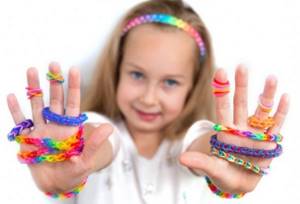
If the child is small, this method is also acceptable, but parents will need to pull back the elastic. This means that control should be maximum.
Folk recipes
Well-established traditional methods of getting rid of such a bad habit are not always considered humane. Many mothers refuse to use such methods, considering them too harsh (“I can’t mock the baby”). However, they should still be listed.
- Perhaps the most common and at the same time controversial method is to smear children's fingers with hot pepper, mustard and similar natural bitterness. It is believed that after tasting such an unpleasant spicy seasoning once or several times, a child will then stop biting his nail plates.
- The older generation often advises treating nails with green paint, since such an unpleasant appearance can repel a child so much that he will stop biting his nails. If, nevertheless, the fingers end up in the mouth, one’s own green lips, seen later in the mirror, can turn the child away from the bad habit.
Such methods are controversial, however, judging by the reviews, they can still work, especially if the child is between two and four years old. Such methods will definitely not work on older children.
Gloves
How to stop a child from biting his nails using gloves? If possible, put gloves on the baby's hands : while falling asleep, watching TV, on the street. In hot weather, you need to use thin gloves made of natural fabrics.
It will even be interesting for girls; create the image of a “lady”. Boys will be happy to wear gloves that will create an unusual look. The less access to your nails, the faster you can eliminate the bad habit. There are also gloves with touch sensitivity for ease of use of the phone.
Recommendations from psychologists
It is not always possible to discover the cause on your own, so parents can turn to a psychologist if, in addition, numerous attempts at weaning have not led to any positive results. Many psychotherapeutic tips are widely known, but they should still be repeated.
- You cannot scold or shout at a child, since such an aggressively expressed interest in a child’s problem, on the contrary, will aggravate the situation. Some kids will become even more nervous, others will begin to bite their nails out of spite. It is better to look for a more positive way to help your child.
- You should definitely talk to your child to establish the “trigger mechanism.” Sometimes methods that reveal subconscious and hidden problems help to discover the cause. For example, you can invite your child to draw a school lesson, friends, and household members. Black colors and obvious negativity indicate a problematic area of life.
- Try spending more time with your little “rodent”. Physical contact is required (patting the head, hugs, finger massage), pleasant words, discussion of pressing problems. That is, the hours and minutes spent with the child must be filled with positive emotions.
- Self-care is necessary to demonstrate positive behavior patterns. It is foolish to expect a child to refuse to bite off nail plates or hangnails if one of the close relatives (especially those who are significant to the child) bites their nails themselves and constantly pushes their fingers into their mouth. Teach a girl to take care of her nails!
- If a child expresses aggression in such an undesirable way, show him socially approved forms of its manifestation. For example, visiting sports clubs, various competitions, and contact games contributes to the splashing out of negative emotions that are no longer directed towards one’s personality.
- Keep your child busy with manual labor, for example, drawing, sculpting, working with scissors, burning will not only keep his hands occupied, but will also bring a lot of positive moments to the baby. Cross stitch is suitable for older girls. In addition, textured objects - stones, construction parts, pimply balls and other small things - help relieve stress.
- It is necessary to talk about negative consequences - unpleasant stories often have the desired effect on older children. Teenagers can independently find various “horror stories” on the Internet in the form of photographs of parasites that grow in the gastrointestinal tract. A small child can be asked to examine through a microscope the dirt from under the nails, which may contain various unpleasant creatures.
- An extraordinary approach is needed to a creative child. In particular, you can compose a fairy tale story that tells about two heroes - one bites marigolds, and the second does not have such a habit. That is why few people communicate with the first and play because of unpleasant-looking hands, while the other has many friends. Fairytale therapy has a positive and indirect effect on children's consciousness.
- It is necessary to reconsider the daily routine. Thus, it is important for two-year-old children and older children to provide a comfortable psychological atmosphere and frequent walks outside. Schoolchildren need to be given more free time, without pressure on grades, success and academic workload.
- If the trigger for onychophagia is an unexpected separation from your beloved mother after being with her all the time, then such a separation can become a serious stress. It is important to gradually accustom the child to independence and independence, for example, you should take him to his grandmother or to kindergarten for a short time so that he gets used to being without his mother.
If correspondence advice does not help in any way, you should contact a psychologist or neurologist. Perhaps the child has developed a neurotic state, one of the signs of which is often obsessive movements.
Common mistakes made by parents
In this situation, parents often make mistakes, the most common of which are the following:
- They don’t fully assess the current situation, they don’t pay attention, believing that everything will work out on its own. This is the biggest mistake. Cases when a child stops biting his nails on his own are very rare.
- Intimidation and threats develop a sense of guilt in the child; he only withdraws into himself and stops trusting his parents.
- Prohibitions: if a child is prohibited, then on a subconscious level he will do what is prohibited.
When a doctor's help is needed
Often the problem lies in physiological problems of the body : lack of mineral components, poor absorption of calcium, elements and vitamins. A gastroenterologist will prescribe herbal medicines, vitamins or mineral complexes based on the condition of the gastrointestinal tract.
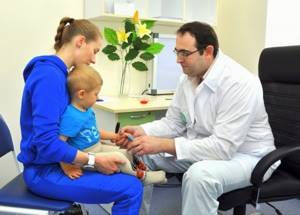
A consultation with a pediatric neurologist will be necessary if it is impossible to cope with the disease on your own.
If onycophagia is persistent and cannot be eliminated by classical neurological and psychological methods, it may be necessary to think about mental illness. The main indicator is a lack of impulse control.
Nail biting is a superficial problem that may indicate a more serious condition. In such cases, hospitalization and selection of psychotropic drugs are necessary. The reassuring thing is that such situations happen extremely rarely.
The bad habit of biting nails must be eliminated comprehensively , using proven methods and methods. Each child is an individual, so you will have to try several methods until you find the right one. The main thing is to maintain a good and trusting relationship with the baby and create a favorable psychological climate in the family.
Article design: Natalie Podolskaya
